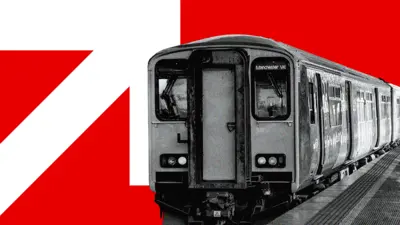We've updated our Privacy and Cookies Policy
We've made some important changes to our Privacy and Cookies Policy and we want you to know what this means for you and your data.
Should we worry about inflation?
- By Douglas Fraser
- Business and economy editor, Scotland
Image source, Getty Images
- As rail, teachers and council workers head towards clashes on pay, inflation is upending the pecking order on pay, and public sector workers risk being left behind
- Bonuses in the private sector employers are ensuring at least some workers' pay stays ahead of rising prices
Should we worry about inflation? Maybe not. A little inflation is a good thing, if everyone's income rises at least at the same pace as prices.
The Bank of England's target of a 2% increase in prices is a safe level for the economy to grow. It takes some of the pain out of relative incomes adjusting gradually, and often imperceptibly.
It also ensures we avoid deflation - the dangerous situation in which people expect prices to drop, so they hold off on spending and investing until they do.
A lot of price inflation, similarly, would not hurt if everyone's income rose at the same rate to keep pace with it.
But of course, income doesn't do that. Inflation is not a problem for those with the leverage and good luck to raise their incomes as fast as prices are rising. It hits hard at those with neither.
Gaps grow between these groups, and often that means inequality growing too.
The figures published in the past week by the Office for National Statistics need to be understood together. Exceptionally low unemployment and more vacancies than people seeking jobs have to be put in the context of prices rising in the past year by 9%.
These figures don't usually go together. Forty years ago, the last time the UK had Consumer Price Inflation at 9%, the government of Margaret Thatcher saw inflation as enemy number one.
Elected in 1979, the Conservative government saw over-powerful trade unions as a key reason for wage inflation. But then, as now, 1970s inflation had also been driven by the externally-set price of oil.
Three million unemployed people, new legislation to hobble trade union activism, and a government that was willing to see nationalised industries cut jobs and close plants, were together intended to squeeze inflation out of wage claims.
Forty years later, workers are powerful once more, but for a different reason. Wage inflation is being fuelled by employers' need of the skilled people required to maintain trading. Others say their growth is constrained by the inability to recruit more.
The answer used to be recruiting from the European labour pool. Not any longer. With Covid, many of Britain's migrant workforce went home. New migrant workers from the EU need work permits, and few of them are being handed out.
So without those recruits, with a tight labour market, Brexit has pushed up wages and put the brakes on some firms expanding. There is a problem of companies operating below capacity.
Image source, Getty Images
To unpack some of these numbers and look where the gaps lie, it's worth noting that the 9% inflation rate is an average.
For those already spending 10% of disposable income on household energy, the impact on household budgets is far greater than those who are not counted as "fuel poor".
The number of Scots in that category, leaving insufficient income for a basic standard of living, was already very high before energy prices began to rise. Scots face lower winter temperatures, so require more heating, and much of our housing is heated inefficiently.
In 2019, Scottish government figures say a quarter of households, or 613,000 households were in fuel poverty, while half of those households were in "extreme fuel poverty" - over the 20% mark on home energy bills.
Factoring in last month's 54% increase in the energy price cap, the boss of E.On has said on BBC radio that he reckons 20% of British households are already in fuel poverty, and that is on course to rise to 40% from October, unless the government steps in. He added that one in eight customers is in arrears, and that will rise.
Those same people are often the same ones spending a high proportion of their income on food.
So with energy and food prices rising, that means - in general - a much higher overall inflation rate for those on low income.
Image source, Getty Images
What then of the relative power of different groups in the UK? This week's figures tell us that bonuses are getting many employers and employees through the crisis.
You might expect as much. Rather than lock in higher basic pay, and in the hope that input costs will fall next year, bonuses can carry companies through the crisis.
Where recruitment and retention is an issue, bonuses can help employers hang on to valued staff, or they are being used to attract new ones.
In the construction industry, they help to plug gaps left by European workers. In finance, they result from some strengthening profit figures.
In some industries, the structural problems of recruitment mean significant growth in basic pay, including truck-driving.
So with bonuses, some people have been able to outpace prices, at least in the year to March.
Average pay plus bonuses were up by 7% - ahead of inflation in the same 12 months. But basic pay, on average, rose 4.2% on average.
Factor in inflation, and those with bonuses were typically 1.4% better off, and those without were typically 1.2% worse off. That is, those only earning basic pay were typically losing real earnings, with less spending power.
Public vs private
A bigger gap has been opening up between public and private sector. The private sector has bigger peaks and troughs.
With a recession, a company is more likely to cut pay, lay off workers and cut back on pension entitlements. At such times, public sector workers provide some stability to household incomes and to the economy.
But as the labour market warms up, private sector pay tends to move ahead of public. And this week's figure show an unusually stark example of this.
Private sector pay was up 8.6%, while public sector pay was up only 1.6%.
That is vulnerable to over-interpretation. The numbers are compared with a time of partial lockdown in 2021, when many were on furlough or self-employed income support, almost all of them in the private sector. So of course, pay could be expected to rise significantly by then.
Image source, Getty Images
But don't be surprised if those arguing for their pay to keep pace with inflation use such figures.
And doing that arguing are trade unions. They have limited penetration of private sector companies, running to only around 15%, and much of that loaded into formerly nationalised companies such as utilities.
They have more than 50% reach into the public sector workforce. And that is where we are already seeing increased prospects for industrial action to make the case for higher pay.
Scottish teachers are asking for 10%, and being offered 2%. Other local government workers in Scotland have been offered 2%, and warn of rolling strikes if that is not raised.
Rail workers, who are among the most willing to use their muscle to protect their conditions and push for higher pay, are showing the Scottish government that public ownership does not lead to an outbreak of goodwill.
Refusing to work overtime, they have forced a cut in the ScotRail timetable by 30%. Industrial action is also brewing south of the border.
Refuse collectors have gained significant increases in pay, due to staffing shortfalls. But the experience of Glasgow City Council is being used by unions to point out that pay equality legislation can be used to ensure other roles dominated by women - such as care workers - should get the same increase.
In any case, there are big reforms due for the care sector, and one of them is ensuring that pay rates are raised for those in the private sector, whose care homes are funded from public funds.
The Scottish government pay policy was set out in December, before inflation took off. It allows for cash increases: no more than £775 for those on less than £25,000 (at least 3.1%); £700 for those above it, up to £40,000, when you can expect £500 (at most 1%).
Ministers at Holyrood take some pride in going above the £9.50 per hour national living wage, the minimum for those aged over 20.
But inflation is also bearing down on that. It is estimated that the national minimum wage will rise by 20% over only two years - far ahead of the capacity of central or local government to keep pace with it, without significant job losses.
For public sector finance directors and those councillors currently forming administrations around Scotland, this is going to be a difficult time. Likewise for those of us who depend on public services affected by disruptive action over pay.
Meanwhile, recruitment firm Hays informs me today that it is finding more than half of professionals want to shift to a four-day week, and expect that to happen within two to five years. Only a quarter of their employers agree.
Compared with the hourly paid, that's another sign of gaps opening wide in employment, pay and in leisure time. It seems that Covid, Brexit and inflation will cast a long shadow.
Top Stories
Features & Analysis
Most read
Content is not available








